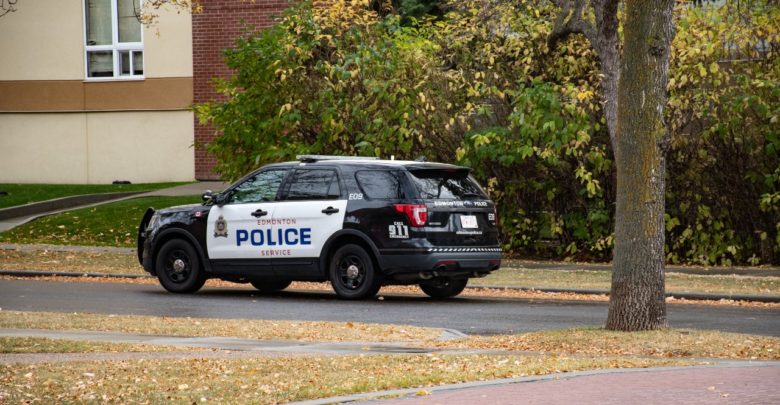Public questions Edmonton Police Commission on encampment removal
“While there are snippets of videos depicting police use of force circulating online, the commission has a statutory role to fulfill, and cannot rush to conclusions,” chair of the Edmonton Police Commission says.
 Cody Shimizu
Cody ShimizuOn May 16, University of Alberta students and community members joined the Edmonton Police Commission’s (EPC) monthly meeting. Registered speakers made statements regarding Edmonton Police Service’s (EPS) dispersal of the Palestine solidarity encampment at the U of A on May 11.
Although originally meant to take place in-person, due to safety considerations, the EPC decided to move the meeting online. This decision followed a protest against EPS that occurred at Edmonton City Hall on May 14, and the attendance of protestors at the presentation of the EPS 2023 Annual Report to city council.
EPC Chair John McDougall began the meeting with a land acknowledgment and statement. McDougall explained that the EPC is an independent, non-political board that oversees EPS, before speaking about the encampment’s removal on May 11, at the university’s request.
“While there are snippets of videos depicting police use of force circulating online, the commission has a statutory role to fulfill, and cannot rush to conclusions,” McDougall said. He also addressed the “concerning” photos taken of the EPS officers who dispersed the encampment while not wearing namebars.
“We’ve set out questions for [EPS] to answer, and we may ask for more reports … to ensure we, as a commission, understand what unfolded over the weekend.”
EPS Chief Dale McFee gave a statement as well. He said that during protests, both the police and protestors have responsibilities.
“We’ve had seven months of safe and vocal protests related to Palestine and Jewish conflict,” McFee said. “I am concerned that the attempts to agitate, intimidate, and cross the threshold into illegal behaviour are indeed growing.”
Registered speakers question EPS’ removal of the encampment
During the public input portion of the meeting, pre-registered individuals were allowed five minutes to speak. A total of 11 individuals spoke. Questions asked by the registered speakers were not answered during the meeting.
Vahedah Mehrabani, a registered nurse, said she no longer trusts EPS after its dispersal of the encampment. Mehrabani criticized the commission for moving the meeting online.
“You all feel unsafe while you’re surrounded by heavy security guards throughout City Hall. Try feeling safe when police [are] swinging batons at your heads.”
Mehrabani said she brought her six-month old baby to the encampment both days, in solidarity with Palestinian children. She didn’t stay overnight when EPS dispersed the camp because she ran out of formula.
“I keep thinking what would have happened to my baby if I had stayed.”
Mehrabani asked that EPS officers involved in the dispersal be investigated and held accountable.
Alexander Dowsey said he was present at the encampment. Statements made about the encampment by U of A President and Vice-chancellor Bill Flanagan and EPS, have given “no clear evidence to support the use of violence that was unleashed on the encampment,” Dowsey said.
Dowsey asked what criteria EPS used to “justify the deployment of force against protesters” and what conversations EPS had with the university when deciding to perform a sweep.
Rachelle Gladue, who was present at the encampment when it was dispersed, said she once pursued a career in policing. Previously, Gladue volunteered as a rioter for EPS riot training. At this training, volunteers were told to “cause disturbances, push police’s buttons, and act in a threatening way.”
“At the U of A, we were met with far more force than I ever experienced during the riot training exercises. This goes to show that the true instigators of aggression were not the protesters, but the police themselves.”
“The city and its citizens have clearly lost trust in this chief,” speaker says
During McFee’s statement, he said that “Israeli, Palestinian, and other Muslim communities have historically found the ability to engage each other peacefully here, [but] are now caught in a dangerous cycle.”
Anahat Virk responded to this point. She cited a Shabbat service led by Independent Jewish Voices (IJV) Edmonton at the encampment, on the evening of May 10.
“I fail to understand what is so violent or dangerous about that,” Virk said.
At the same meeting, those in attendance received a Control Tactic Report for 2023. Naiha Wasi asked how the community can trust the data in this report.
“From what I have presented and witnessed, it is evident that EPS displayed disproportionate force and caused injuries. However, the police stated to the media that no one was injured,” Wasi said.
“I question the validity, honesty, and integrity of this report being presented. I implore the commission to reflect on the pictures and videos from the sweeping of the encampment.”
Katy Ingraham said that if the EPC will not hold EPS to account, they should step down. Ingraham also called for the termination of McFee.
“The city and its citizens have clearly lost trust in this chief. He is no longer someone that we can trust with public safety in [Edmonton].”
-With files from Leah Hennig




